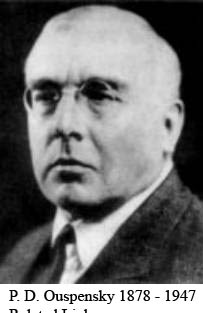- Return from India.
- The war and the"search for the miraculous".
- Old thoughts.
- The questions of schools.
- Plans for further travels.
- The east and Europe
- A notice in a Moscow newspaper.
- Lectures on India.
- The meeting with G.
- A "disguised man".
- The first talk.
- G's opinion on schools
- G's group.
- "Glimpses of Truth."
This article can be found in "Views from the Real World" by the early students
of Gurdieff and it begins with the Ballet "The Struggle of the Magicians" (How strange
it seems that the encounter was fated. From that momenton Ouspensky's life has changed) About the ballet:
It seem that Nijinsky knew of the movements. I think I saw a photograph of the legendary impresario
Serge Diaghilev , Igor Stravinsky, Matisse and Gurdjieff in Paris.
- Further meetings and talks.
- The Organization of G.'s Moscow group.
- The question of payment and of means of the work.
- The question of secrecy and of the obligation accepted by the pupils.
- A talk about the East.
- "Philosophy," "theory," and "practice."
- How was the system found.
- G's ideas.
- "Man is a machine" governed by external influences.
- Everything "happens."
- Nobody "does" anything.
- In order to "do," it is necessary "to be."
- A man is responsible for his actions; a machine is not responsible.
- Is psychology necessary for the study of machines?
- The promise of "facts."
- Can wars be stopped?
- A talk about the planets and the moon as living beings.
- The "intelligence" of the sun and the earth.
- "Subjective" and "objective" art.
(See chapter #14 for some additonal
explonations on objective and subjective knowledge.)
|
 Return
Chapter#2
Return
Chapter#2